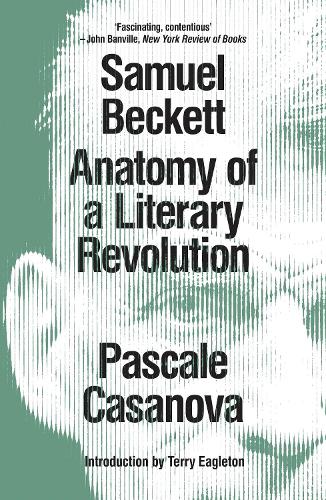
Samuel Beckett: Anatomy of a Literary Revolution
(Paperback)
Publishing Details
Samuel Beckett: Anatomy of a Literary Revolution
By (Author) Pascale Casanova
Introduction by Terry Eagleton
Translated by Gregory Elliott
Verso Books
Verso Books
3rd March 2020
United Kingdom
Classifications
General
Non Fiction
Literary studies: c 1900 to c 2000
Literary theory
848.91409
Physical Properties
Paperback
128
Width 129mm, Height 198mm, Spine 8mm
110g
Description
In this fascinating new exploration of Samuel Becketts work, Pascale Casanova argues that Becketts reputation rests on a pervasive misreading of his oeuvre, which neglects entirely the literary revolution he instigated. Reintroducing the historical into the heart of this body of work, Casanova provides an arresting portrait of Beckett as radically subversivedoing for writing what Kandinsky did for artand in the process presents the key to some of the most profound enigmas of Becketts writing.
Reviews
Enlightening in its investigations into writers and philosophers who contributed to Beckett's intellectual progress. Casanova does add something significant to the enormous existing canon of Beckett information. -- John Calder * Islington Tribune *
Fascinating, contentious. -- John Banville * New York Review of Books *
Praise for The World Republic of Letters:
Nothing like this has been attempted before. The World Republic of Letters is likely to have the same sort of liberating impact at large as Said's Orientalism. -- Perry Anderson * London Review of Books *
Praise for The World Republic of Letters:
A brilliant, groundbreaking book.Casanova's work amounts to a radical remapping of global literary space The breadth of her scholarship here is staggering: from South America to North Africa, Eastern Europe to East Asia; from the emergent Modernism of Ibsen andYeats to the most recent postcolonial hybridities; from 'assimilationists' like Naipul and Cioran to 'rebels' like Neruda and Achebe. She has created a map of global literary power relations where none had existed, and she has raised a host of further questions. -- William Deresiewicz * Nation *
Praise for The World Republic of Letters:
An excellent book. Today's international space, as Casanova sees it, is created through a rivalry between the growing number of nations eager to establish a literary prestige, promoting their poets and novelists internationally with the help of government institutions. -- Tim Park * Times Literary Supplement *
Praise for The World Republic of Letters:
This book, which unlike many other works of literary theory is written with exemplary lucidity, represents a milestone in the history of modern literary thought. -- Terry Eagleton * New Statesman *
Author Bio
Pascale Casanovais a Researcher at the Centre for Research in Arts and Language and a literary critic in Paris. She is the author ofThe World Republic of Letters.
